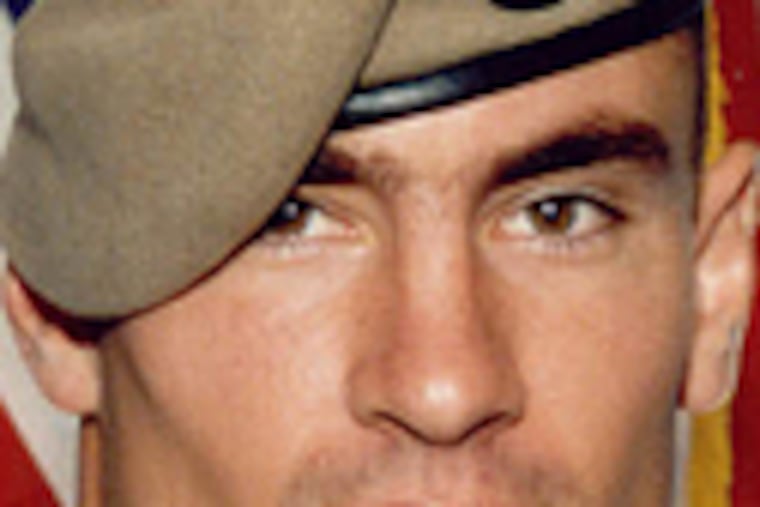At Tillman hearing, talk of lies
WASHINGTON - The brother of Army Ranger Pat Tillman accused the Pentagon and the Bush administration yesterday of deliberately concealing the circumstances of the former football star's friendly-fire death in Afghanistan in an effort to avoid embarrassment.

WASHINGTON - The brother of Army Ranger Pat Tillman accused the Pentagon and the Bush administration yesterday of deliberately concealing the circumstances of the former football star's friendly-fire death in Afghanistan in an effort to avoid embarrassment.
Speaking publicly for the first time since his brother was killed in Afghanistan in April 2004, Kevin Tillman at a congressional hearing accused Army and administration officials of exploiting his brother's death to shift attention away from the detainee abuses at Iraq's Abu Ghraib prison, which at the time was about to become a public-relations nightmare for the military.
Investigations by the Army, including an inspector general's report last month, have not established any conspiracy to cover up the cause of Tillman's death. But top officers, including four generals, have been criticized for failing to tell his family the truth for more than a month afterward, and could face criminal charges.
Kevin Tillman, who gave up a minor-league baseball career to enlist with his older brother in the aftermath of the Sept. 11 attacks and who was nearby when Pat Tillman was shot by fellow American soldiers, said the military's early, heroic depiction of his brother's death was "utter fiction . . . intended to deceive the family and more importantly the American people."
"To our family and friends, it was a devastating loss. To the nation, it was a moment of disorientation. To the military, it was a nightmare," Kevin Tillman said, his voice wavering. "But to others within the government, it appears to have been an opportunity."
In his brother's case, he charged that evidence was destroyed, an autopsy did not conform to regulations, and eyewitness testimony "disappeared into thin air."
Rep. Henry A. Waxman (D., Calif.), chairman of the House Oversight and Government Reform Committee, said he called the hearing, which also included testimony by Pfc. Jessica Lynch, because "the bare minimum we owe our soldiers and their families is the truth."
In the case of Tillman and Lynch, Waxman said, "the government violated its most basic responsibility."
Army Spec. Bryan O'Neal, an eyewitness to Tillman's death and the last person to see him alive, told lawmakers that one of his superiors had instructed him not to tell Tillman's brother or family about the circumstances of the shooting, even though he knew it was a case of fratricide.
"I was ordered not to tell them," O'Neal said, adding that the order came from Jeff Bailey, then the lieutenant colonel in charge of the platoon. "He made it known that I'd get in trouble" for speaking with the family, O'Neal said.
According to the Associated Press, Bailey's superior officer, then-Col. James C. Nixon, has testified to the Pentagon's inspector general that he ordered that information on the facts of Tillman's death be shared with as few people as possible so that the Tillman family would not learn those facts through news-media leaks. That, in turn, shaped Bailey's guidance to his troops.
Waxman released a copy of a "valorous award witness statement" attributed to O'Neal that suggested Tillman died during a firefight with enemy combatants. But O'Neal reiterated an assertion he made to Pentagon investigators that the unsigned document had been changed from the version he submitted.
The Tillmans have dismissed as insufficient repeated Pentagon probes into the killing. They are angry that Army officers let them bury Tillman while believing he had been killed in a battle with enemy fighters, and that he was awarded a Silver Star based on false premises.
After the release of last month's inspector general's report, the Tillmans renewed a push for congressional hearings.
The committee released an exchange of messages indicating that the White House had been seeking information about Tillman just days after his death for use in a speech by President Bush. However, a response at the time from military officials suggested that senior officers were aware that Tillman's death likely was caused by fratricide.
An officer, whose name was redacted, wrote to U.S. Central Command: "I felt it was essential that you receive this information as soon as we detected it in order to preclude any unknowing statements by our country's leaders which might cause public embarrassment if the circumstances of Corporal Tillman's death become public." A speech by Bush days later included a reference to Tillman but did not mention the circumstances of his death.
Lynch, the Army truck driver captured in an ambush during the early days of the Iraq war, recounted how the news media repeated "the story of the little girl Rambo from the hills who went down fighting."
She added: "It was not true."
She said the story of her capture and a dramatic rescue videotape that was released by U.S. forces may have helped "inspire our troops and rally a nation," but she said the real heroes were her comrades who died during the ambush.
"The bottom line is the American people are capable of determining their own ideals for heroes," she said. "They don't need to be told elaborate tales."
To watch video excerpts of testimony by Kevin Tillman and Jessica Lynch, go to http://go.philly.
com/tillmanlynch
EndText